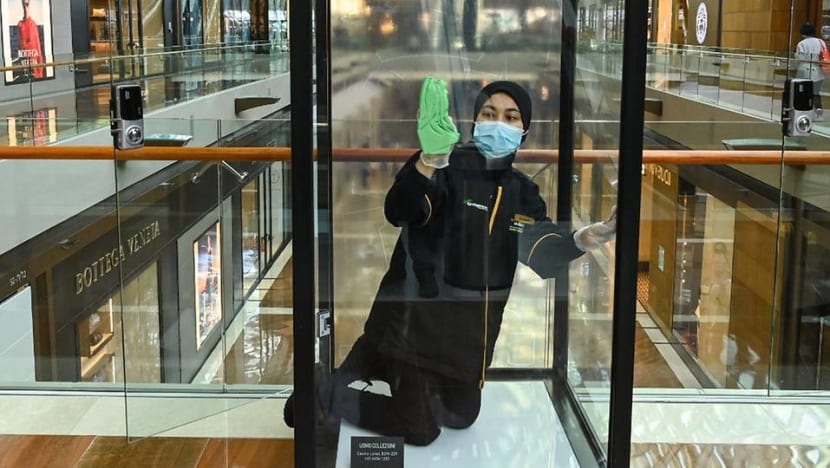There's 'always a risk': How cleaning companies in Singapore are keeping its employees safe amid the COVID-19 pandemic

A cleaner wipes a display case at a shopping mall in Singapore. (Photo: AFP)
SINGAPORE: Providing masks, ensuring staggered break times and frequent reminders to wash hands: These are some of the measures cleaning companies in Singapore are taking to keep its workers safe amid the COVID-19 pandemic.
Cleaners from Chye Thiam Maintenance are frequently reminded on how to wear masks correctly and to wash their hands thoroughly, said senior vice president of corporate development and strategy Yap Shih Chia.
The company services Jewel Changi Airport, which is closed to the public until Jun 13 along with the airport’s passenger terminals, following the emergence of a cluster of COVID-19 cases at the airport.
READ: New COVID-19 cluster linked to cleaner at Changi Airport
Protection provided to cleaners has fallen under the spotlight in recent weeks after some of them contracted COVID-19.
The first case detected in the Changi Airport cluster was a cleaner, an 88-year-old Singaporean man who works at Changi Airport Terminal 3.
Investigations by the Ministry of Health found that a cleaner who works at Park Avenue Rochester, a stay-home notice dedicated facility - may have been the source of infection of at the Jem and Westgate shopping malls in Jurong.
Jem and Westgate are currently shut in a bid to reduce COVID-19 transmission in the community.
There is also an active COVID-19 cluster involving six cleaners from Hong Ye Group.
And a 76-year-old Singaporean man employed by Clean Solutions as a cleaner at Henry Park Primary School was also found to have the disease.
Once Changi Airport was identified as a COVID-19 cluster, all cross-deployment to other buildings was stopped, even if it was only done on an emergency basis before this, said Chye Thiam Maintenance's Mr Yap.
The firm, which employs about 2,000 cleaners deployed across Singapore, sent out a circular to tell its employees not to mingle with one another, he said.
“For the, Jewel (team), they are not allowed to cross into any other team,” he said. "Zone managers stationed at Jewel Changi are also not allowed to return to headquarters. We are trying to isolate everybody."
Jewel Changi apart, Chye Thiam Maintenance's cleaners are deployed at other parts of the airport, including at the cargo handling areas, as well as at government buildings and shopping malls.
Mr Yap said the cleaners have been reminded to be more vigilant, with the COVID-19 positive cases at their doorstep.
The “key thing” is that people can contract COVID-19 anywhere, said Mr Yap.
“It can happen to anyone anywhere, especially (since) our cleaners are out there on the frontline,” he said.
The cleaners at Chye Thiam Maintenance are also told to have staggered lunch breaks and not to congregate in places.
“We try all we can. Since they are out there, it’s always a risk,” he said.
READ: 24 new community COVID-19 cases in Singapore; cleaner at SHN facility may be source of Jem/Westgate transmission
READ: Changi Airport terminals and Jewel to remain closed to public; additional COVID-19 testing for 'very high-risk' arrivals
USE OF PROPER MASKS, SAFETY EQUIPMENT
At Cleaning Express, employees are provided with surgical masks and masks with filtration capabilities, said Mr Steven Ong, senior manager in the human resources and training department.
These masks have at least 95 per cent bacterial filtration efficiency, he said.
“When providing intensive pandemic cleaning services, they will don full personal protective equipment as per National Environment Agency guidelines,” he said.
Such intensive cleaning is provided at premises visited by COVID-19 cases at the request of clients, he said. The company has about 1,100 cleaners who work at malls, schools and healthcare facilities.
He added that recently, the firm made arrangements for hand sanitiser bottles to be attached to existing janitorial trolleys, so cleaners are able to "practise better hand hygiene more frequently, and with ease”.
The cleaners are also reminded to take their temperature twice a day and keep tabs on their health, said Mr Ong.
“We are also tracking the vaccination schedules of our cleaners and encouraging those (who have been given medical clearance) to get vaccinated,” he said.
Given that about 40 per cent of cleaners are above the age of 60, operations and safety teams on the ground are staying vigilant to ensure their well-being, Mr Ong added.
At Imperial Cleaning Service, a spokesperson said that its cleaners - who are mostly deployed at condominiums - are given staggered break and lunch times to prevent them from gathering.
They are also not allowed to cross over to neighbouring blocks, he said.
At their daily meetings, the cleaners are also reminded to wash their hands and to always keep their masks on. The cleaners are also required to dispose of their gloves and masks and use a new set after they have had their meals.
Given that many of the cleaners are elderly and may have trouble remembering the steps, the spokesperson said that the mixing of the chemicals to meet the authorities’ standards is left to supervisors.
Infectious diseases specialist Leong Hoe Nam, who practices at Mount Elizabeth Hospital, said that cleaners working in higher-risk areas like hotels that serve as stay-home notice facilities need to ensure that their masks are properly fitted all the time, as they have higher exposure to the virus.
"There's a daily chance they will meet someone with COVID-19," he said.
In general, cleaners need to be careful when they are clearing rubbish and in bathrooms, where people blow their noses, he said.
"When clearing rubbish, you are clearing a lot of tissue paper with respiratory secretion. This is where transmission can happen,” he added.
PANDEMIC DISINFECTION
Other than cleaners deployed to do regular cleaning and waste management, Chye Thiam Maintenance has an 80-man team that is trained to do pandemic disinfection.
They are deployed when the cleaning company is engaged to disinfect places that have been visited or occupied by COVID-19 patients, or for preventive purposes.
To protect themselves, the team members don overalls, N95 masks, goggles and face shields, said Mr Yap. They also are trained to wear and remove their protective gear in the right order - which is an important step, Mr Yap said.
The company created a team for such specialised disinfection work in 2016 and has been practicing for such a situation since then, he said.
The team has been involved in disinfection efforts at several places, including at dormitories and hotels.
Mr Douglas Wang, director of A-Guard Environmental Hygiene, said that even when his company is engaged for preventive works, his team of bio-decontamination specialists treat the spaces as if they have been visited by COVID-19 positive individuals.
“Every time we go in, (we treat it as if) it’s 'live',” he said.
A-Guard Environmental Hygiene is in the business of ensuring that indoor air quality is up to mark by removing contaminants such as bacteria and fungus.
Such work requires the use of chemical masks, which are of the same grade as N95 masks, but come with chemical gas filtration.
"This is to protect the (cleaners) against the airborne bacteria, mould and chemical used in disinfection," said Mr Wang.
Since the start of the pandemic, they have decontaminated places linked to confirmed COVID-19 cases - places like hotels, dormitories, and homes - he said.
Mr Wang's teams work with a minimum of two people per team and they take about two to three hours for one project.
They wipe down all high-touch surfaces in accordance to NEA's guidelines; and as additional steps, use ozone and chemical misting to kill viruses in areas that may have been inaccessible such as high walls, ceilings and fabric surfaces, he said.
Other than chemical masks, they don chemical gloves, goggles, face shields and overalls, he added.
In their training, they liken the virus to acid, Mr Wang said.
“We tell them it’s like acid. So we remind them that they won’t touch acid with their bare hands and even if they touch, they won’t touch other parts of their body without washing it away,” he said.
While the cleaning companies try to keep their employees safe, Chye Thiam Maintenance's Mr Yap said safety boils down to the individual.
“No matter how well trained they are, I guess after a while, you get tired, uncomfortable … you might not think about, but you might take off your glove and rub your nose or something. It’s a very, very subconscious thing,” he said.
BOOKMARK THIS: Our comprehensive coverage of the COVID-19 pandemic and its developments
Download our app or subscribe to our Telegram channel for the latest updates on the coronavirus outbreak: https://cna.asia/telegram












